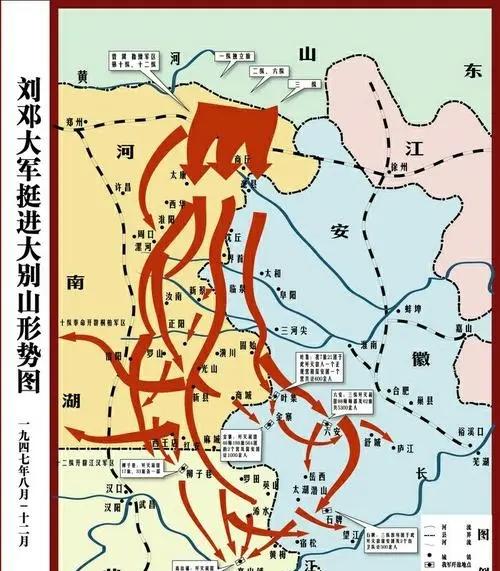
Edit the search image
▲ Map of the situation of Liu Deng's army going south
▲ Report on the annihilation of the reorganized 66th Division of the Kuomintang Army
Liu Deng's army advanced into dabie mountain
On June 30, 1947, Liu Bocheng and Deng Xiaoping led the 1st, 2nd, 3rd and 6th Columns of the Jinji-Hebei Luyu Field Army and two independent brigades, totaling 120,000 people, to break through the natural danger of the Yellow River in the southwest of Luzhou, officially kicking off the prelude to the national strategic counteroffensive. In the following half a month, Liu Deng's army fought continuously, annihilating nearly 60,000 people in 9 and a half brigades, including the song ruike department of the enemy's elite 66th Division of American weapons. Subsequently, Liu Deng's army set off again to the south, crossing the Huangpan area, breaking through the Shahe, Yinghe, Huaihe and other defensive lines, and finally entering the Dabie Mountains on August 27, completing the task of leaping forward for a thousand miles.
When the news came, panic spread like a plague in the Kuomintang-ruled areas, especially in the middle and lower reaches of the Yangtze River adjacent to the Dabie Mountains, and all kinds of news such as "Wuhan is tight" and "the Yangtze River is tight" have not gone away. Cheng Qian, director of the Wuhan camp, hurriedly ordered that, in addition to mobilizing troops to go into the city to strengthen defenses, he also announced that a "volunteer police corps" would be organized in the city to defend Wuhan, as if Liu Deng's army had already arrived in the city. Nanjing, 300 kilometers away, was also alarmed for several days, and the security headquarters hurriedly ordered the imposition of martial law on the Yangtze River after 9 p.m.
▲Nanjing Presidential Palace
The Kuomintang propaganda apparatus was instructed to calm the people's minds
Chiang Kai-shek was very dissatisfied with the panicked situation in which his subordinates did not verify or report that they were in charge of the situation, and urgently summoned Dong Xianguang, director of the Information Bureau of the Executive Yuan, and Deng Wenyi, director of the Information Bureau of the Ministry of National Defense, and threw a tantrum: "What are you in charge of?" Why didn't the division of Dabie Mountain publicize it, not send out news, and let rumors spread? Dong and Deng did not dare to be idle, and immediately after they returned, they held a press conference with great fanfare and announced: "The communist army is wandering through Dabie Mountain, creating an impression that they are very active, but in fact this impression is groundless." Liu Bocheng's and Deng Xiaoping's subordinates were forced to scurry south, passing through five major rivers along the way, including the Huangpan District, the Shahe River, and the Huai River, and were surrounded and blocked by the Nationalist army, and their troops were exhausted, and there were very few remnants of bandits entering the Dabie Mountains, and they were really vulnerable and could be eliminated soon. ”
Of course, this kind of appeasement lies do not need to be said by outsiders, and even the Kuomintang authorities themselves are not willing to believe it, because in just two short months, Liu Deng's army did not take the lead in purging, but instead approached the north bank of the Yangtze River, controlled the 300-kilometer river bank from Huayang Town in the east to Wuxue in the west, and occupied Shucheng, Lujiang, Tongcheng, Qianshan, Guangji, Yingshan, Wangjiang, and Wuxue. Xiaochikou, an important town in Jiangfang, has also been lost, which is a prominent part formed in the middle reaches of the Yangtze River, and the river surface is narrow, and Liu Deng's army can cross the river at any time to attack the "Seven Provinces Thoroughfare" and "Northwest Gate" of the river - Jiujiang City, which are opposite.
▲ Chiang Kai-shek deployed defenses
The mountain was laid to win the first victory of Dabie Mountain
On October 10, Mao Zedong, who was far away on the Loess Plateau in northern Shaanxi, issued the "Declaration of the people's liberation army Chinese", which had openly shouted the slogan of "Down with Chiang Kai-shek and Liberate All China". Just half a month later, Liu Deng's army laid an ambush on the high mountain of the Hao (Shui) Guang (Ji) Highway, completely annihilated more than 12,000 people of the enemy's reorganized 40th Division and the 82nd Brigade, captured a large number of materials, began to annihilate the enemy on a large scale through movement warfare, and gained a firm foothold in the Dabie Mountains.
▲ Liu Deng's army was in a fierce battle
▲Declaration of the people's liberation army of Chinese